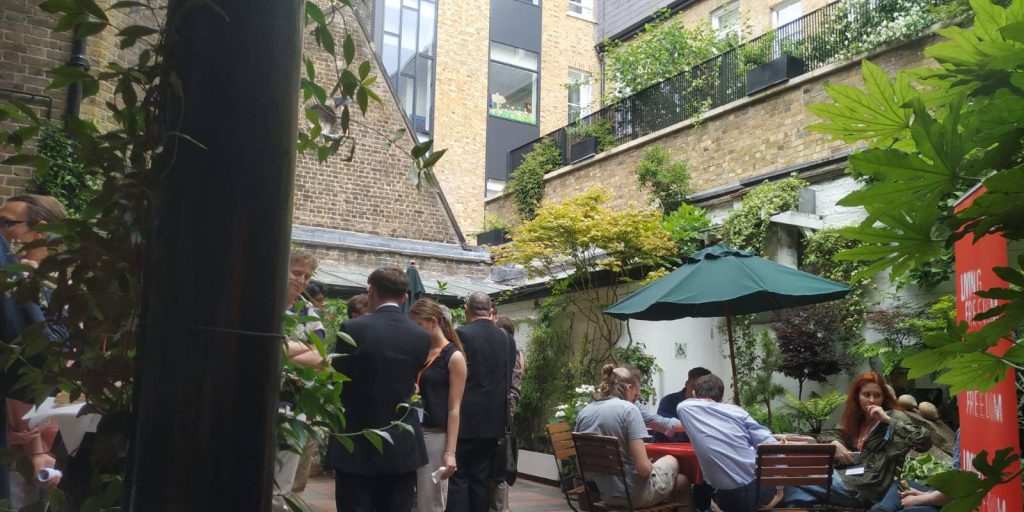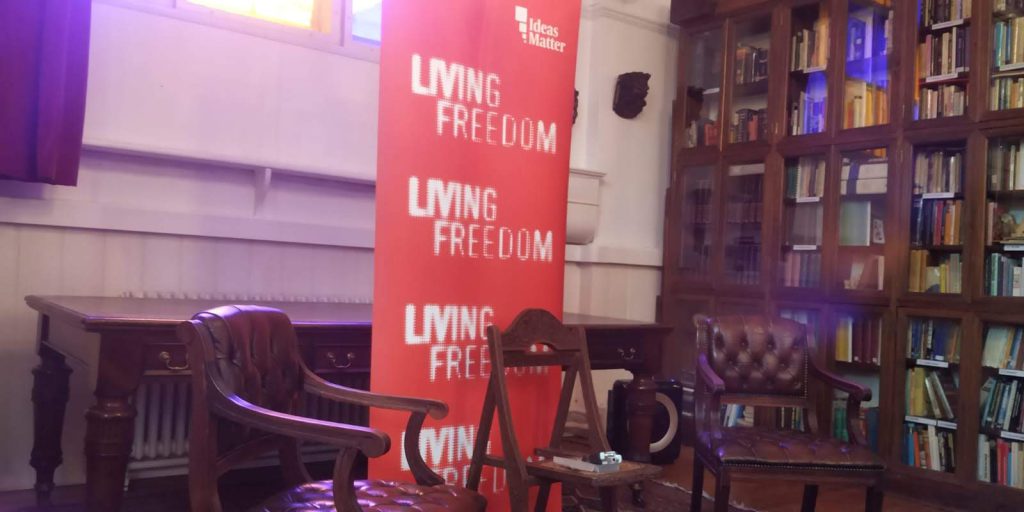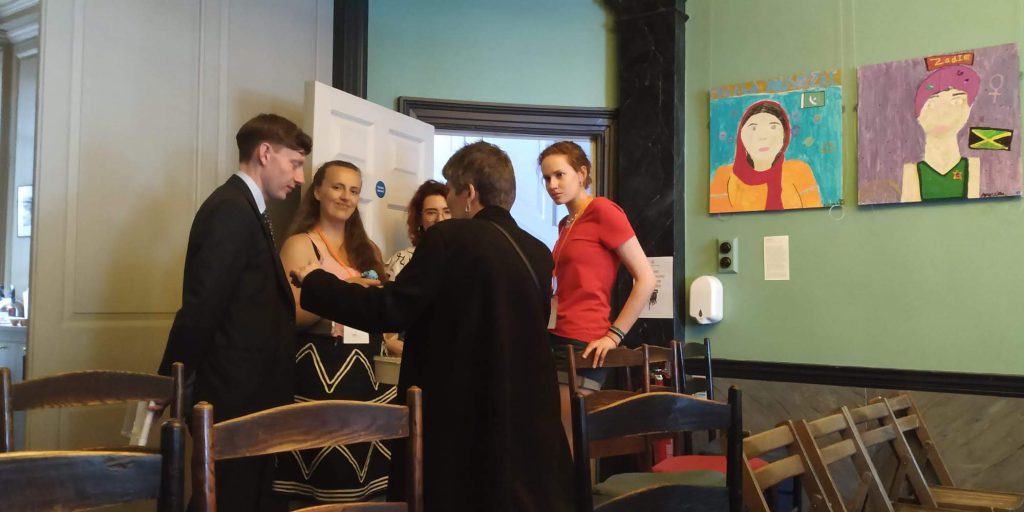Last week was one of the busiest and most frantic in a long time, and you can read about its eventfulness here. This post focuses on one of the many things I did during that week, namely attending the Living Freedom politics conference.
My sister went last year and I was so jealous, as Living Freedom involves listening to a bunch of journalist speakers whose work I’ve been following for years now. When she mentioned the likes of Frank Furedi and Claire Fox, I was sold. So this year I got her to pull some strings and I was allowed to come along to the conference despite it being aimed at 18-30 year olds.
And I am so glad I did! I got to meet and chat with the journalists and commentators who have been my career role models for so long, and to listen to their insights in the form of fascinating talks and lively debates. I’ve never felt as in-my-element than in those conference rooms, listening wide-eyed to politicians and academics, or afterwards hanging out in the pub (don’t tell the government) with people who, like me, value freedom of speech, the exchange of ideas, and constructive debate and discussion.
In this post I’ve discussed some of the lectures which I found most interesting.
Professor Frank Furedi, ‘Freedom of conscience: 21st century challenges’
I went to Living Freedom with my sister Tilly, her boyfriend Jasper and friend Natalya. The conference is held in London, so we got the train there on Friday morning and spent the day wandering around the city, checking in to our slightly dodgy hostel, and generally killing time until the first lecture of the conference was given by Frank Furedi that evening: ‘Freedom of conscience: 21st Century Challenges’.
This lecture was primarily focused on the idea that we should always stay true to our individual beliefs and inclinations. The less you allow external norms to change how you act, the stronger you are as a moral individual. Furedi discussed the conflict inherent between one’s own personal religion, be that an actual faith or just your own moral principles, and the idea that others should have the freedom to behave in accordance with their own religion. Furedi argued that one should stick to one’s own principles, so long as they are not harming others, while always tolerating the principles of others.
To this I asked Furedi whether there are any limits to what we should tolerate. Should we not take a stance against the oppression of women in Islam in the name of toleration? I also asked about the Jewish custom of circumcising babies, which he had brought up in his talk, and whether having the freedom to enact your beliefs on your children is simultaneously depriving your child of the right to choose whether they wish to be circumcised. Furedi’s answer was disappointingly relativist. He said there should be no limits at all as to what we should tolerate, and then blatantly evaded the whole question around the oppression of women. To the circumcision part of my question, he said, “I don’t believe in children’s rights.” I thought that he was joking at first, but apparently he wasn’t, and he quickly moved on to the next question, leaving me slightly shocked, to say the least!
I very much enjoyed Furedi’s talk, and was honoured to have been even in the same room as such a renowned academic, not least to have engaged in discussion with him personally. However, I was disappointed with the extremely relativist direction he suddenly took, and I wasn’t the only one who found his argument unsound at times.
Dr Joanna Williams, ‘Freedom in the age of identity politics’
The next morning, we had a lecture by Joanna Williams, ‘Freedom in the age of identity politics.’ In this fascinating lecture, Williams discussed how “unprecedented [levels of] personal liberty” have laid bare a paradox in today’s woke society. While we are free to identify as whatever gender, species or race we wish to, free to pursue whatever line of work we wish to, live wherever we wish to and associate with whomever we wish to, we are subjected to mandatory diversity training, for example, apparently in an effort to conserve those aforementioned liberties. By definition, identity politics groups people based on characteristics outside their control, such as ethnicity or sexuality, and gives some such groups privilege over the others. A black lesbian’s perspective is seen by subscribers to identity politics as objectively more valuable than that of a ‘pale, stale male’. In a society where ‘lived experience’ is valued over objective fact, we find ourselves prefacing opinions with ‘Speaking as a woman/ethnic minority/gay person’, as though we have to use these characteristics to justify any kind of opinion.
This focus on one’s group identity obliterates the potential for individuality. Real freedom requires powerful individuals, not the fragile people of today’s generation who are constantly seeking ‘affirmation’, to come together over the one commonality which we all have: humanity. We need to stop segregating ourselves into arbitrary groups and start interacting with one another more productively, with a focus on the content of our characters, our merits and our values, not our skin colour or sexuality.
Tiffany Jenkins, ‘WhatsAppened to privacy?’
If you can excuse the terrible pun in that title, this lecture was really excellent and fascinating. Jenkins explored the concept of freedom of speech when taken in the context of the tricky overlap between private and public life. Should we have the right to say the same offensive things in public that we might say in private? Should we even have that right in private? Scotland was in the headlines in 2021 for banning private conversations deemed ‘offensive’ in your own home, with the possibility of serving seven years in prison for holding such conversations.
While this may seem scarily dystopian, it can easily be argued that privacy can sometimes be dangerous. In the case of the Lockdown Files, which saw the release of many WhatsApp messages between government ministers during the Covid-19 lockdowns, we saw some rather sinister jokes being made and dystopian ideas being tested out. So should politicians and other high-up figures follow different rules around privacy to public citizens?
Fraser Myers, ‘A war on civil society?’
Fraser Myers, deputy editor of the spiked magazine, began this talk by establishing the terms misinformation (‘deliberately lying’), disinformation (false information spread as propaganda) and malinformation (information which is true, but could be used in ‘harmful’ ways). He mentioned that it might be true that the Covid vaccine can have terrible side effects, but that this fact is really malinformation, because (this is Myers’ example) if someone were to make a Twitter page detailing the effects of the vaccine, it might give an ‘untrue image’ of the vaccine. At the end of the talk, I asked Myers about all these convoluted different types of information. The bare bones of my question was, Who gets to decide what information is dis-, mis- or mal-information, and how can we decide when some people obstruct certain pieces of information from being available to the public? The fact that Myers believes that vaccine side-effects is somehow ‘malinformation’ does not mean that the general public are not entitled to see it and decide for themselves. Besides, I am very uncomfortable with the whole concept of ‘malinformation’. Surely if information is true, it should always be available for people to see? (Another debate we should have lies around the idea that perhaps even information that we know to be false should be available, too.)
The rest of his talk mainly centred on the idea that freedom of association and expression lie at the core of a successful society, and on the struggle between ‘protecting’ the masses from ‘harmful’ information and preserving said masses’ freedom. I found it ironic of Myers to be giving a talk about the importance of discussion and debate in society, when he recently went viral for calling Andrew Bridgen a conspiracy theorist who spreads misinformation, without any evidence for his claim and shutting Bridgen down when he tried to discuss the issue.
Despite finding Myers’ talk slightly hypocritical, and being generally wary of the different ‘types’ of information he claims are out there (information is information and everyone has a right to see it!), I have followed his journalism with spiked and felt honoured to be able to ask him my questions personally. He is a very engaging speaker and I learnt much from his talk.
Ella Whelan, ‘Online harms to trigger warnings: safetyism vs freedom‘
This talk, given by spiked journalist Ella Whelan, focused on the thin line between protecting citizens from harm (both online and in the real world) and becoming too much of a nanny state. Whelan specialises in women’s freedom in relation to these topics, so she spoke during her talk about abortion, advocating for the decriminalisation of it. I asked her at the end of her lecture what she made of the recent case of a woman who has been imprisoned for around 2 years for illegally aborting her 8 month old baby. I find this case disgusting. Yes, the woman in question must have been going througm
h utter psychological turmoil to feel like this was her only option at this stage in her pregnancy. But that does not give her the right to murder a completely viable baby. Of course, if she had given birth naturally a few weeks later and then killed the baby, it would have been classed as murder and she would have been jailed for a lot longer than two years. Unfortunately, Whelan evaded my question, saying only that she felt deep sympathy for the mother. I feel sympathy for the tiny baby who was murdered. (And I think it says a lot about the current state of our society when I wonder if I should delete that last sentence in case it’s too offensive or opinionated.)
All this said, I have huge respect for Whelan as a journalist, and I’ve watched her many times on the news and read her articles. I can’t stress enough how surreal it felt to be in the same room as all these speakers, let alone directly engaging in conversation with them!
Overall, I massively enjoyed this weekend, and it has only reaffirmed in my mind that my dream job would definitely be somewhere in journalism. 😊


